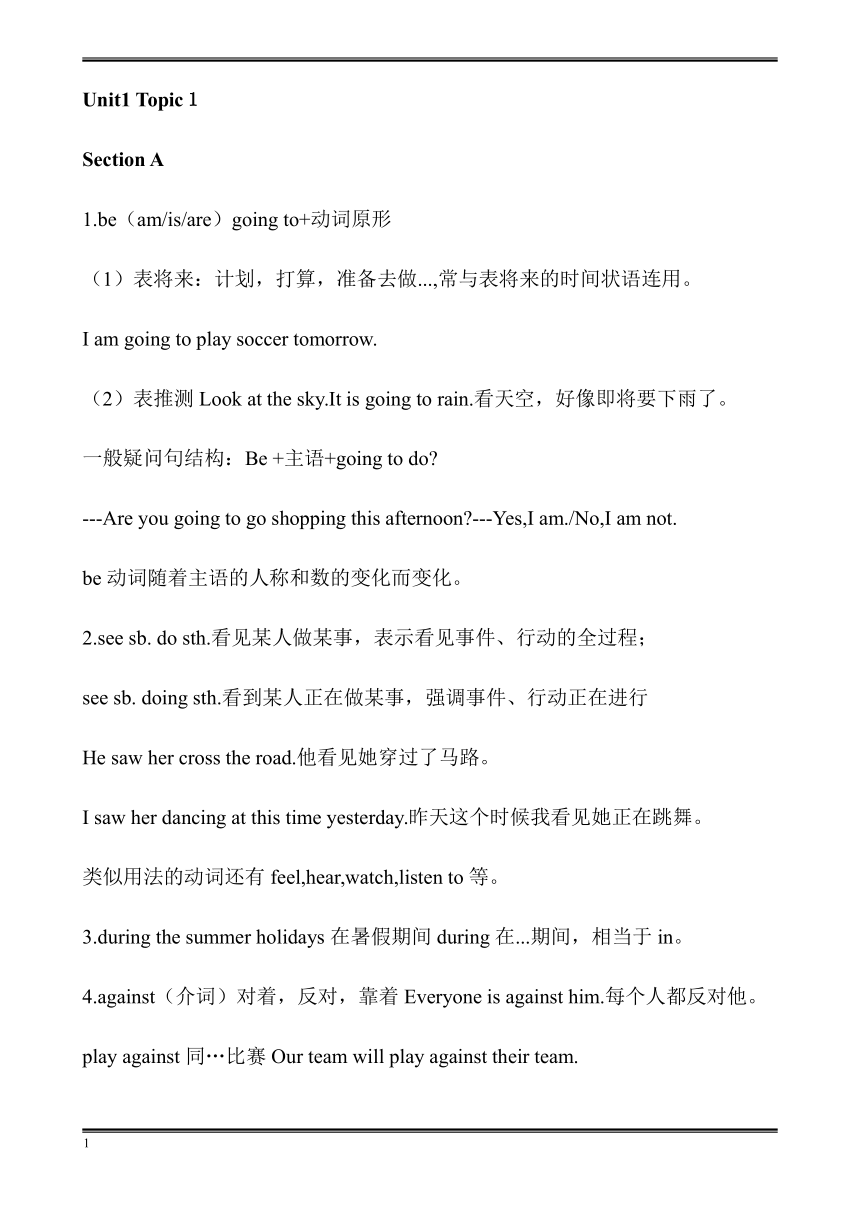
1228090011049000Unit1 Topic1 Section A 1.be(am/is/are)going to+动词原形 (1)表将来:计划,打算,准备去做...,常与表将来的时间状语连用。 I am going to play soccer tomorrow. (2)表推测Look at the sky.It is going to rain.看天空,好像即将要下雨了。 一般疑问句结构:Be +主语+going to do? --Are you going to go shopping this afternoon?--Yes,I am./No,I am not. be动词随着主语的人称和数的变化而变化。 see sb. do sth.看见某人做某事,表示看见事件、行动的全过程; see sb. doing sth.看到某人正在做某事,强调事件、行动正在进行 He saw her cross the road.他看见她穿过了马路。 I saw her dancing at this time yesterday.昨天这个时候我看见她正在跳舞。 类似用法的动词还有feel,hear,watch,listen to等。 3.during the summer holidays在暑假期间during在...期间,相当于in。 4.against(介词)对着,反对,靠着Everyone is against him.每个人都反对他。 play against同…比赛Our team will play against their team. play with sb.同某人一起玩play with sth.玩弄某物 I often play with my friends. The cat is playing with a ball. against作为介词,还有“紧靠;倚”的意思。Eg: Put the piano there,against the wall.把钢琴放在那,紧靠着墙。 5.hope常用于以下两种结构: (1)hope to do sth.希望做某事。I hope to study in Beijing.我希望在北京读书。 (2)hope+that从句,that可以省略。I hope(that)you will win. 6.win赢,赢得,过去式为won。winner胜利者 7.cheer...on(以欢呼)激励某人,为某人加油,向某人欢呼 cheer on sb.(具体名词)eg:We all cheer on the little girl.我们都为这小女孩加油。 cheer sb.(具体名词)/人称代词 on. eg:We all cheer the little girl on./we all cheer her on. 8.Which sport do you prefer,...or...?=Which sport do you like better,...or...?你更喜欢哪种运动? 回答用I prefer...=I like...better.我更喜欢... prefer过去式preferred prefer sth.更喜欢某物He prefers apples.他更喜欢苹果。 prefer doing sth.更喜欢做某事、宁愿做某事 Many students prefer playing basketball.许多学生更喜欢打篮球。 prefer to do sth.更喜欢去做某事、宁愿做某事 I prefer to read English in the morning.我喜欢在早上读英语。 prefer doing sth.与prefer to do sth.的区别: prefer to do sth.强调特定的或某此具体的动作,即在一定的场合下宁愿做什么,表示暂时性的喜欢。 prefer doing sth.强调一般性倾向,即对某种行为的偏爱,表示长时间的,一贯性的喜欢。 prefer sth to sth.和...相比更喜欢... Most of the students prefer cycling to walking.和走路比起来,大部分的学生更喜欢骑自行车。 9.Do you often...?=Do you ... much?你经常做...吗? Do you often...?肯定回答:Yes,I do.否定回答:No,I don’t. Do you ... much?肯定回答:Yes,quite a bit/a lot.否定回答:No, seldom. 在肯定句、否定句或疑问句中,(very)much和quite a bit/a lot一样,常与行为动词连用,用来描述某个动作发生的频率,或与表示情感的动词连用,表示情感的深浅程度。 I go to that shop so much.我经常光顾那家商店。 quite a bit/a lot 许多,大量quite a lot of 后既可接可数名词也可接不可数名词。 e.g. He read quite a lot of books.他读了许多书。 We got quite a lot of information on the Internet.我们在网上得到许多信息。 quite a few 意为“相当多、颇有几个”。后接可数名词的复数。 e.g. Quite a few students are reading books.相当 ... ...
~~ 您好,已阅读到文档的结尾了 ~~

